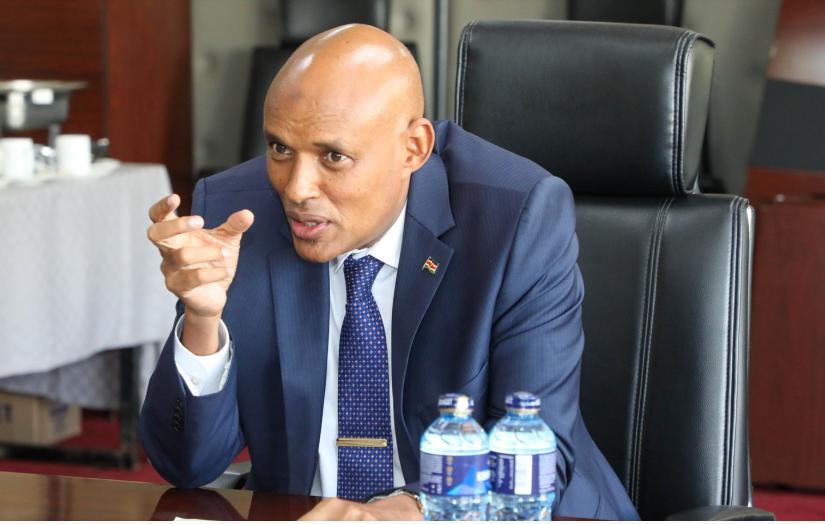The Director of Criminal Investigations Mohammed Amin has defended the decision not to summon teacher Albert Ojwang before his arrest, saying detectives feared he might destroy crucial evidence linked to a cybercrime probe.
Ojwang died in police custody under unclear circumstances, sparking national outrage and sharp criticism from the opposition.
While answering questions from senators on Wednesday, Amin said investigators had initially been tracking an anonymous X account and did not know Ojwang’s true identity at the time.
“When it comes to investigations, particularly on matters of cybercrime, it isn’t a walk in the park. You are starting from the unknown to the unknown. You are dealing with individuals operating in the dark web, using pseudo accounts, and whose platforms are domiciled in other jurisdictions,” he said.
“At the commencement of our investigations, we did not know the true identity of Albert Ojwang. We were only dealing with an X handle, a person whose identity was not known to us, and it was therefore not possible for us to summon him.”
Justification
Amin explained that it took time and technical expertise to unmask the identity of the person behind the X account, which investigators eventually linked to Ojwang. He said this justified the move to arrest him directly.
“Sometimes, summons might be prejudicial or even interfere with investigative processes. For example, when investigating a cybercrime and you want to recover a computer from a suspect, you cannot just summon them to report to a police station. The risk is that the suspect might delete information you require as evidence in court,” he said.
He added: “That’s why sometimes we may not opt to summon suspects, but instead go for them directly. If someone holds crucial materials or documents for the investigation, giving them notice could give them time to destroy or tamper with that evidence.”
Transfer to Nairobi
Amin said he did not personally order the transfer of Ojwang from Homa Bay to Nairobi, explaining that his officers act independently.
“In terms of who ordered Albert’s transfer, Honourable Speaker, we don’t micromanage investigations. We give officers leeway to make professional decisions,” he said.
“Our officers are well guided by our service standards and investigative procedures.”
'State-sanctioned cover-up'
Meanwhile, the opposition has intensified calls for accountability, accusing the state of hiding the truth about Ojwang’s death. Former Public Service Cabinet Secretary Justin Muturi, speaking alongside opposition leaders Kalonzo Musyoka and Rigathi Gachagua, demanded the arrest and prosecution of Deputy Inspector General of Police Eliud Lagat.
“When 31-year-old Albert Ojwang walked back to his home, neither he nor his relatives knew these would be his final moments,” said Muturi.
“Albert was the only hope of his parents and a father to a young child. Now he is gone — and no one is being held accountable.”
Ojwang was arrested in Homa Bay on June 7 and taken to Central Police Station in Nairobi, where he later died. The circumstances of his transfer and death have drawn strong public interest and concern.
Unexplained gap
Muturi said there is a 26-hour gap between Ojwang’s arrest and his arrival in Nairobi that has not been explained.
“We demand to know: Was there a formal complaint by DIG Lagat? Was an arrest warrant issued? Which officers escorted him — by name and rank?” he asked.
He also criticised the decision by the Office of the Director of Public Prosecutions to hand over the investigation to the Independent Policing Oversight Authority, calling it “a smokescreen.”
“That is a cover-up. The public is not interested in face-saving statements. They want truth, justice, and accountability,” Muturi said.
He raised concerns over reports that CCTV cameras at Central Police Station were switched off during Ojwang’s detention.
“If he was not in solitary confinement, who were his cellmates? If cameras were disabled, who ordered that? Who was present when Albert took his last breath?” he asked.
CCTV footage
Muturi demanded that the CCTV footage be released and called for the names of all those involved in Ojwang’s detention and possible assault to be made public.
He further demanded the arrest of DIG Lagat within 24 hours and called for protection of junior officers who may have crucial information.
“This country cannot afford to normalise state brutality. The life of every Kenyan matters, whether they are a minister’s son or a fisherman’s child. Justice for Albert Ojwang must not be delayed or denied,” he said.

